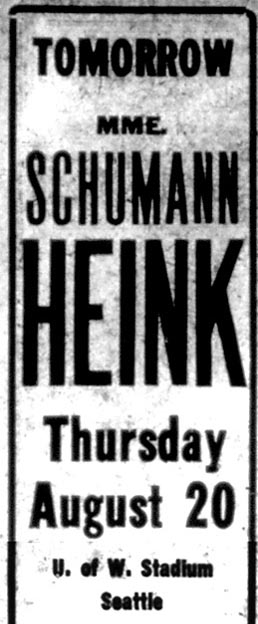On the otherwise lovely evening of Thursday August 20, 1925, a performance at the University Stadium featuring the world-famous singer Ernestine Schumann-Heink (1861-1936) has an abrupt, noisy, and disappointing finale for attendees.
Road Tours Across America
Madame Schumann-Heink was the Austrian-born American contralto and mezzo-soprano star who had been a European opera sensation for years prior to becoming a member (1898-1903) of New York City's Metropolitan Opera Company. She then embarked on a string of cross-country concert tours in America, which solidified her reputation and made her a musical legend.
Reported to be one of the most brilliant vocalists of her time, Schumann-Heink was famed for taking on the most challenging works -- song that required "not only technique and virtuosity but also charm, temperament and personality!" (cantabile-subito.de).
The Seattle Show(down)
When one of Schumann-Heink's tours led to Seattle during the summer of 1925, she checked into the New Washington Hotel -- accompanied by her 14-year old grandson, Hans August, and pianist Arthur Loesser. The Associated Students of the University of Washington had booked Schumann-Heink to perform at one of the "Symphony Under the Sky" concert series dates at the UW's sports stadium adjacent to the Lake Washington ("Montlake Cut") Ship Canal. The Seattle Times informed that many of the 10,000 $1 seats would be scooped up by attendees at that week's Pacific Northwest Merchants Exposition, stating "Visitors to Hear Diva Tonight."
These concerts were wonderfully idyllic affairs that, as Seattle businessman Henry Broderick later recalled, usually "resulted in beautiful memories" for concert-goers (Broderick). However, this time, just when "Madame Schumann-Heink was in the midst of the fascinating strains of 'Only God Can Make a Tree,'" disaster struck when "there ensued terrific blasts from a tug in a nearby canal, whistling for the opening of the University drawbridge. She went on for a few seconds, then raising her hands in a gesture of despair, exclaimed, 'I can’t compete with that'" (Broderick). And on that final note -- a loud and brassy one, no doubt -- the diva's performance came to an abrupt halt.
But all was not lost. As Broderick noted, "many of the leads in the cast gathered that evening" to party at the home of Seattle's fabled Prohibition-era bandleader Victor A. Meyers (1898-1991).

